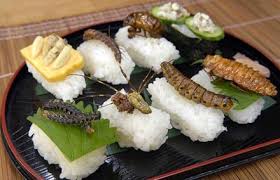 |
| Who is eating who? |
Recently there has been a whole glut of books and articles about food and growing practices. Organic is good and genetically modified food is bad. The movie Food Inc., the author Michael Pollan and the book and movie Fast Food Nation has stirred the pot and caused us to question a lot about what we eat. However, there seems to be a lot of finger pointing and not many questions about the nature of our food.
What is the purpose of food? Is food only about eating and health? Of course if there is a food that is actually a poison, that would be bad, like the wells in Bangladesh that was discovered to have a natural arsenic in them, and so was killing off many villagers, over a period of years. But should we look at food as only "healthy and unhealthy"? Even though we all recognize that a pack of M&Ms aren't necessarily healthy, a starving child in Darfur would be overjoyed to have such a pack and no one would refuse it to her. Nor a genetically modified carrot.

Of course, food isn't only about health. There are many cultural factors involved in food. Most places in the world would find pickled caterpillars to be distasteful, but not in Congo (and they really are tasty... nutty). When we look at food, we want to know it's source and who made it and what it is made of because if there is horse or Monsanto or bugs involved, we don't want to have anything to do with it. But these are cultural factors. What is the difference between horsemeat and beef? What is the difference between Monsanto and your local farmer who might (or might not) beat his wife? What is the difference between bug-filled food and the fact that we are actually filled with bugs ourselves? The fact that our culture teaches us that one is acceptable and the other not, for many reasons. Perhaps we need to distinguish issues of culture and acceptability within our society and actual health. Just because a cake looks like a newborn baby doesn't mean it isn't tasty (nor does it mean that we should eat it). If we are concerned about cultural issues, should we rise a cry of alarm, if the health risks are actually minimal?
 |
| Super Size Me star getting a checkup |
Of course, science should determine what is healthy and not healthy. But which science? The science of thirty years ago that told me that eggs were bad for me or the science of twenty years ago that said that eggs were healthy? The science of modern medicine that focuses on medicine or of naturopathic medicine that focuses on naturally grown medicines? Western science or Chinese or Indian? Each of these sciences can give very different options and, for the most part, their methods are a black box to almost all of us and we only know their conclusions. We trust one and not another, often because we grew up with one and not another. We might change our minds radically from what we grew up with, and we might not, but who is to say that one choice or another in listening to science makes us live better or not? It is not given for us to know what would happen, only what did.
 |
| Who makes our decisions about our food? |
In the end, the questions about food come down to epistemological ones-- how do we know that this information or that is true for me? And even if it is true for me, how do I know it is true for someone else? Do I have enough time to follow up every study ever written? And should I bother about it when I am relatively healthy? Are there conclusions that every form of science agrees with (like a high level of some cholesterol is bad), and should we look for consensus between different disciplines? How much should we remember that everything we put into our bodies-- whether a carrot or an M&M-- creates a chemical change in us, and which chemical changes do we really want? How much of our food should be medicinal, and how much of it preventative and how much of it enjoyment? And how much should we insist that our family and friends make the same choices as we about our food?

